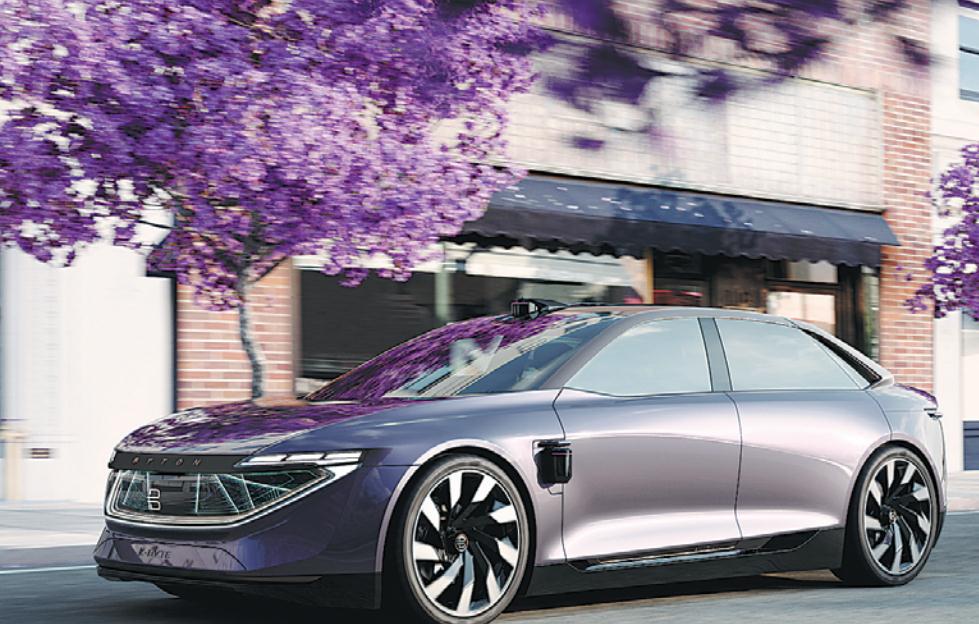Cutting-edge concept cars shine at Shanghai show
By Hao Yan | China Daily | Updated: 2018-06-25 11:17

The dazzling Consumer Electronic Show Asia in Shanghai shone a spotlight on an exciting array of Chinese automobile makers-with futuristic concept vehicles debuting their cutting-edge automated driving technologies.
While the other halls at the show, which wrapped up a week ago, featured smart home technologies and even dancing robots, the car companies were easy to spot for their flashy and exotic concepts.
Hot on the heels of its world premiere the day before the show's opening, also in Shanghai, Chinese electric smart vehicle maker Byton's second concept car-the K-Byte luxury electric sedan-enthralled visitors with its advanced autonomous driving capabilities.
With its lidar, or laser radars integrated into the roof and body panels, the concept car is designed for level-4 autonomous driving-self-driving vehicles requiring only occasional prompted human intervention. Nanjing-headquartered Byton achieved that through its partnership with United States-based autonomous driving technology company Aurora, allowing its drivers eyes-off-road relaxation time.
"Sensors, radar, lidar, and other autonomous driving equipment were integrated into the design of the electric sedan," said Carsten Breitfeld, CEO and co-founder of Byton, in an interview with China Daily.
"We want to convey the message that it's about data and connectivity in the future," he added.
Sharing the same technical platform, both the Byton K-Byte sedan concept and M-Byte sport utility vehicle concept feature a 49-inch (124.5-centimeter) curved full-screen dashboard, a touch screen in its steering wheel, two screens for rear passengers, facial recognition, autonomous driving technologies and two battery power options.
The sedan is expected to make it onto the Chinese market in 2021, one year after the SUV's market launch in 2020, at a starting price of 300,000 yuan ($47,000) for the 71 kWh battery model, according to company.
At the show, a virtual reality experience of Byton's intelligent cabin was offered on-site-for visitors to get a thorough understanding of Byton's intelligent cabin.
In the VR experience, each of the four seats were configured for different scenarios, ranging from laid-back relaxation, to an entertainment setting and even an emergency use mode that can be used if the car is en route to hospital.
He Chao, head of 5G automobile connectivity at Huawei, said the race to introduce intelligent cabins was heating up among autonomous driving vehicle makers.
"The key to the implementation of intelligent cabins is to link the contents in the cabin with those on the internet," he said on June 11 at the Global Automotive Forum in Chongqing.
Guo Konghui, a leading academician of the Chinese Academy of Engineering-who has headed up many auto industry projects-noted at the forum that the development of intelligent vehicles required thorough research in each of the specialized fields, to tackle all of the problems sequentially in order to make improvements before putting them into use.
Byton currently has half its research and development team working on information technology architecture that will enable connections between users in cabins and the outside world, through interactive contents displayed on a 1.2-meter curved screen.
Byton's president and cofounder Daniel Kirchert said his team would not falter in moving forward, after receiving praise and recognition worldwide. "We need to be twice as fast as our rivals," Kirchert added. The company is also working on a third concept model, a seven-seater electric multi-purpose vehicle, which is set to be unveiled next year.
It will utilize the same platform as its predecessors, but is designed for use in ride-hailing, shared rides, and carpooling.
























